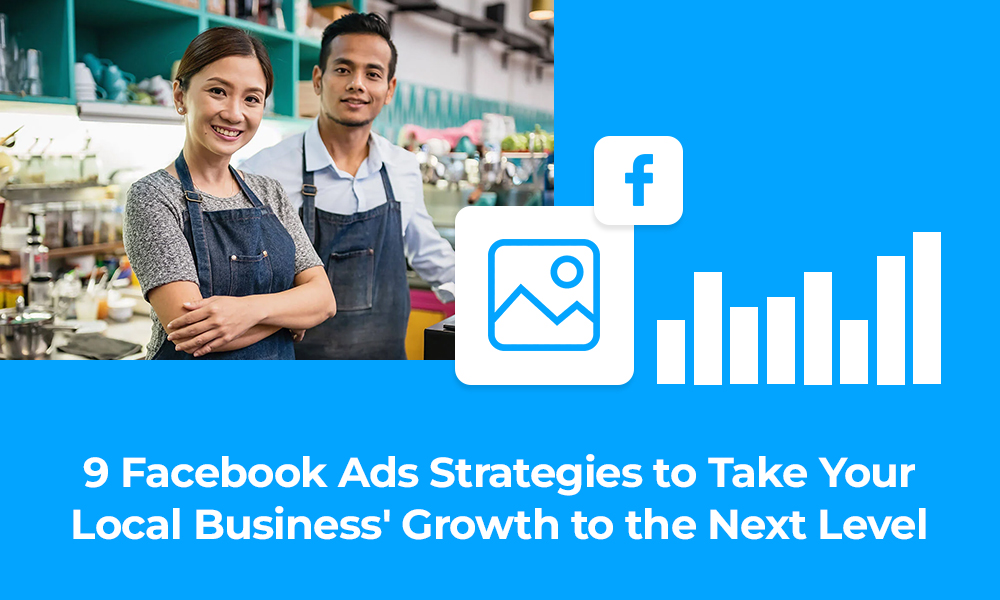Facebook advertising has revolutionised the way local businesses reach their audience, providing tools and insights previously unimaginable. As a local business owner, leveraging Facebook Ads effectively can significantly boost your growth and visibility. With over 2.8 billion active users, Facebook offers a vast potential audience. However, simply launching an ad isn’t enough. You need a well-thought-out Facebook Ads strategy to make a real impact. This comprehensive guide will explore nine detailed strategies to help you take your local business to the next level.
What Facebook Advertising Strategies Are Best for Your Business?
An effective Facebook advertising strategy ensures that your ads reach the right audience and drive meaningful results. Let’s dive into the most impactful strategies tailored for local businesses.
Get Your Target Audience Right
Understanding your target audience is the cornerstone of any successful Facebook advertising strategy. Facebook ad targeting allows you to define your audience based on various parameters such as age, gender, location, interests, and behaviours.
Why It Matters: Precise targeting ensures that your ads are shown to individuals who are most likely to be interested in your products or services, thereby increasing the chances of engagement and conversions.
How to Do It:
- Utilise Facebook’s Audience Insights Tool: This tool helps gather data about your potential customers, including demographics, page likes, location, and purchase behaviour. By leveraging this data, you can create highly specific audience segments that are more likely to respond positively to your ads.
- Create Custom Audiences: Use your existing customer data to create custom audiences. This includes uploading your customer email list to Facebook. By targeting people who have already shown interest in your business, you can increase the likelihood of conversions.
- Lookalike Audiences: Facebook allows you to create lookalike audiences that resemble your existing customers, expanding your reach to new potential customers. This strategy is particularly effective for discovering new audiences with similar characteristics to your best customers.
Organise Your Google Ads Account
Though primarily focused on Facebook, integrating your Google Ads strategy with Facebook Ads can create a cohesive digital marketing approach. Organising your Google Ads account can help streamline your campaigns and improve efficiency.
Why It Matters: A well-organised Google Ads account complements your Facebook ad campaigns, ensuring consistent messaging and targeting across platforms. This integrated approach can enhance your overall advertising effectiveness and provide a unified brand experience for your audience.
How to Do It:
- Structured Campaigns and Ad Groups: You can organise your campaigns and ad groups based on themes, products, or services. This structure makes it easier to manage and optimise your ads.
- Consistent Keyword Research: Align your keyword research for Facebook ads with your Google Ads to maintain consistency and relevance. This ensures that your messaging remains cohesive across different platforms.
- Cross-Platform Tracking: Use tools like Google Analytics to track performance across both Google and Facebook Ads, allowing for better optimisation and insights. This holistic view helps you understand the customer journey and make informed decisions about your ad spend.
Analyse the Competition
Facebook ad competitor analysis is crucial for understanding what works in your industry and doesn’t. By examining your competitors’ ads, you can gain valuable insights and inspiration for your campaigns.
Why It Matters: Understanding your competitors’ strategies helps you identify gaps in the market and opportunities for differentiation. You can refine your Facebook advertising strategy by learning from their successes and failures.
How to Do It:
- Use Facebook Ad Library: This tool lets you see your competitors’ ads. Analyse their ad copy, creative elements, and targeting strategies. Look for patterns and elements that seem to resonate with their audience.
- Evaluate Engagement Metrics: To gauge the effectiveness of competitors’ ads, look at the likes, comments, and shares. High engagement rates often indicate successful ads.
- SWOT Analysis: Conduct a SWOT (Strengths, Weaknesses, Opportunities, Threats) analysis based on the competitor ads you’ve researched. This analysis helps you identify your strengths and opportunities while recognising potential threats and weaknesses.

Keyword Research and Selection
Effective keyword research for Facebook ads is essential to ensure your ads appear in front of the right audience. Selecting the right keywords can drive more traffic and increase conversions.
Why It Matters: Proper keyword selection helps your ads reach users actively searching for products or services like yours, increasing the likelihood of clicks and conversions. It also ensures that your ad spend is used efficiently by targeting relevant search queries.
How to Do It:
- Use Facebook’s Keyword Suggestions: Facebook provides keyword suggestions based on your business category. These suggestions can help you identify popular and relevant keywords for your ads.
- Analyse Search Intent: Choose keywords that match the intent of your audience, whether they are looking for information, making a purchase, or seeking local services. Understanding the intent behind search queries can help you create more targeted and effective ads.
- Long-Tail Keywords: Incorporate long-tail keywords that are more specific and less competitive. These keywords can be particularly effective for local businesses. They often have higher conversion rates because they capture more specific user intents.
Improve Your Ad Copy
Your ad copy’s quality significantly impacts the success of your Facebook Ads. Engaging, clear, compelling ad copy can capture attention and drive action.
Why It Matters: Effective ad copy communicates your value proposition and persuades users to take the desired action, such as visiting your website or purchasing. Good ad copy can differentiate your business from competitors and make your ads more memorable.
How to Do It:
- Focus on Benefits: Highlight the benefits of your products or services rather than just the features. Explain how your offerings can solve problems or enhance the customer’s life.
- Include a Strong Call to Action (CTA): Clear and compelling CTAs, such as “Shop Now,” “Learn More,” or “Contact Us,” encourage users to take the next step. A strong CTA can significantly increase conversion rates.
- Use Emotional Triggers: Craft ad copy that resonates emotionally with your audience, addressing their needs, desires, or pain points. Emotional appeals can be very effective in motivating users to take action.
Optimise Your Landing Pages
Your landing page is where the magic happens. An optimised landing page ensures that users who click on your ad are more likely to convert.
Why It Matters: A well-optimised landing page provides a seamless user experience, increasing conversion chances and lowering bounce rates. The more relevant and user-friendly your landing page, the better your ad performance will be.
How to Do It:
- Ensure Relevance: Ensure the landing page content matches the ad copy and user expectations. Consistency between your ad and landing page is crucial for maintaining user trust.
- Fast Load Times: Optimise your landing page for quick load times to prevent users from bouncing. Slow-loading pages can lead to high bounce rates and lost conversions.
- Clear CTAs: Clear and prominent CTAs guide users towards the desired action. Make it easy for visitors to understand what they need to do next.
- Mobile-Friendly Design: Ensure your landing page is responsive and provides a good experience on mobile devices. With the increasing use of mobile devices, a mobile-friendly design is essential.
Maintain a Negative Keyword List
A negative keyword list helps prevent your ads from appearing in irrelevant searches, saving your budget for more qualified leads.
Why It Matters: Negative keywords improve the relevance of your ads, increase click-through rates, and ensure your budget is spent more efficiently. You can focus your ad spend on more promising opportunities by excluding irrelevant search terms.
How to Do It:
- Identify Irrelevant Searches: Regularly review search terms that triggered your ads and identify irrelevant keywords. Look for terms that do not align with your business or ad objectives.
- Update Your List Frequently: Continuously add new negative keywords to your list based on performance data. As you gather more data, you can refine your list and improve ad relevance.
- Use Facebook’s Exclusion Options: Utilise Facebook’s exclusion options to refine your audience targeting. This can help you avoid showing ads to users who are unlikely to convert.
Take Advantage of Ad Assets
Facebook offers various ad assets, such as images, videos, carousels, and collections, to enhance your ads and engage your audience more effectively.
Why It Matters: Different ad assets can increase engagement, provide more information, and appeal to different audience segments. Diverse ad formats can capture attention differently and keep your audience interested.
How to Do It:
- High-Quality Images and Videos: Use high-quality, relevant, and engaging visuals. Visual content is more likely to capture attention and convey your message effectively.
- Carousel Ads: Use carousel ads to showcase multiple products or features in a single ad. This format allows you to highlight different aspects of your offering and encourage users to explore more.
- Collection Ads Combine images, videos, and product information in a single ad format that allows for an immersive shopping experience. By providing a richer user experience, collection ads can drive higher engagement and conversions.
- Dynamic Ads: Use dynamic ads to automatically show the right products to people who have expressed interest in your website or app. Dynamic ads are personalised and can significantly improve conversion rates.
Test Location Targeting and Ad Scheduling
Location targeting and ad scheduling are crucial for local businesses to reach their audience at the right time and place.
Why It Matters: Effective location targeting ensures your ads are shown to users in specific geographic areas. In contrast, ad scheduling ensures they appear at optimal times. This precision targeting can maximise your ad spend and improve campaign performance.
How to Do It:
- Geo-Targeting: Use Facebook’s location targeting to reach users in specific cities, regions, or neighbourhoods. This feature is particularly useful for local businesses aiming to attract nearby customers.
- Local Awareness Ads: Create ads specifically designed to increase awareness in your local area. These ads can highlight your location, business hours, and local promotions.
- Ad Scheduling: Test different ad schedules to determine the best times to run your ads based on when your target audience is most active. Scheduling your ads during peak times can increase visibility and engagement.
Conclusion
Implementing these nine Facebook ad strategies can significantly enhance your local business’s growth and visibility. Each strategy is vital in maximising your ad performance, from precise audience targeting and competitor analysis to optimising ad copy and landing pages. Remember, continuous testing, analysis, and optimisation are the keys to success. By refining your approach and staying updated with the latest Facebook advertising trends, you can ensure your local business remains competitive and thrives in the digital landscape.
FAQs
Measuring the success of your Facebook Ads campaigns involves tracking various metrics such as reach, impressions, clicks, click-through rate (CTR), conversion rate, and return on ad spend (ROAS). Utilise Facebook’s Ads Manager to monitor these metrics and gain insights into your ad performance. Additionally, integrating Facebook Pixel on your website can help track user actions and conversions, providing a comprehensive view of your campaign’s effectiveness. By analysing these metrics, you can determine which strategies are working and where improvements are needed.
Yes, it is necessary to have a business page on Facebook to run ads. A business page provides a platform to showcase your brand, products, or services. It allows you to access Facebook’s advertising tools. It also enables you to build a community, engage with your audience, and gain insights through analytics. Without a business page, you cannot leverage the full potential of Facebook’s advertising features.
Absolutely! Facebook’s location-targeting features allow you to reach users in specific neighbourhoods, cities, or regions. You can set precise geographic parameters for your ads, ensuring they are shown to users in your desired locations. This is particularly beneficial for local businesses aiming to attract customers from their immediate vicinity. You can tailor your messaging and offers to meet local needs and preferences by targeting specific areas.
By following these detailed strategies and tips, you can optimise your Facebook advertising strategy and drive significant growth for your local business. Remember to continually monitor and adjust your campaigns based on performance data to achieve the best results.











